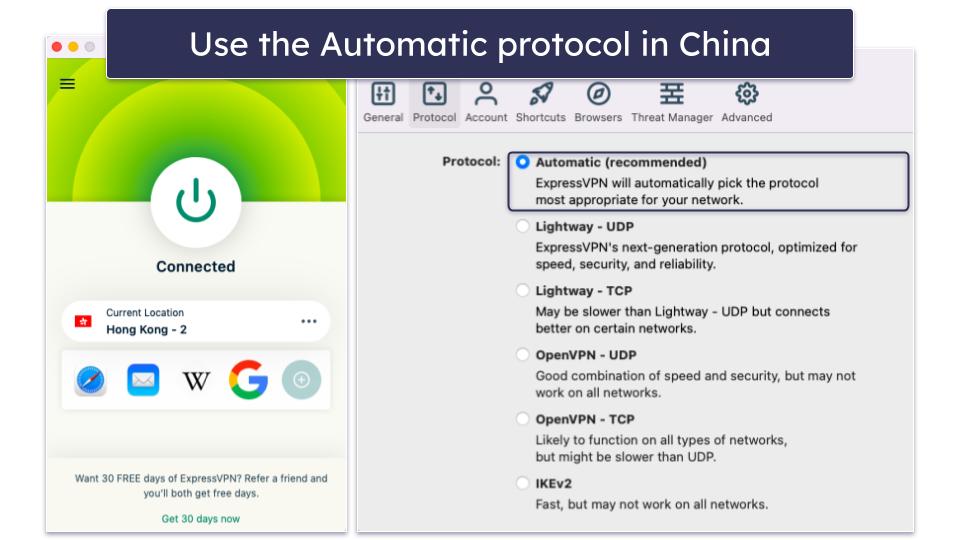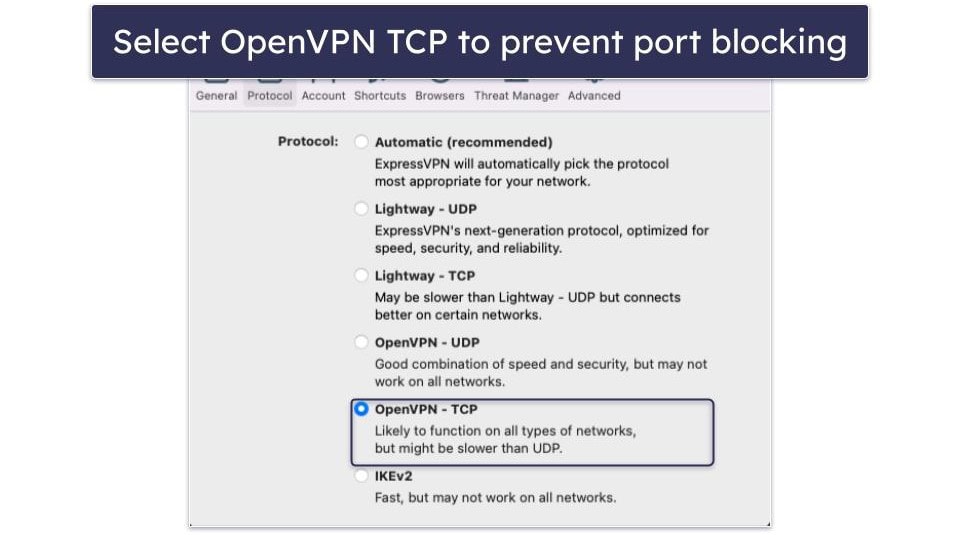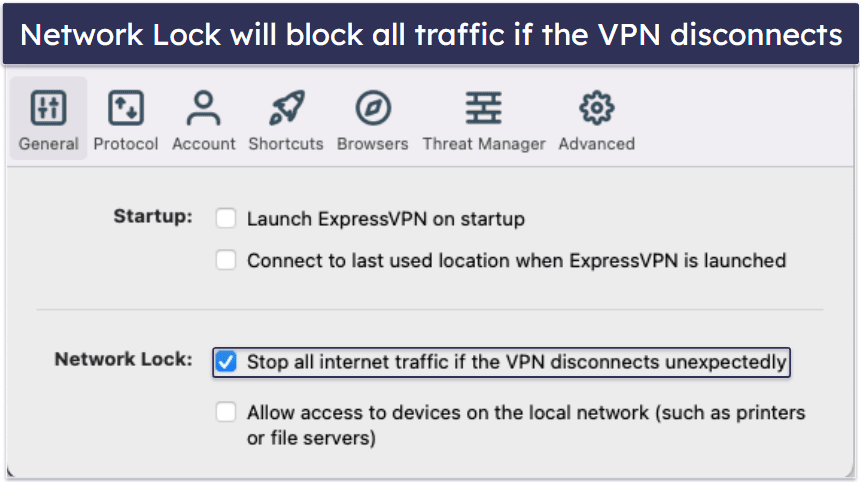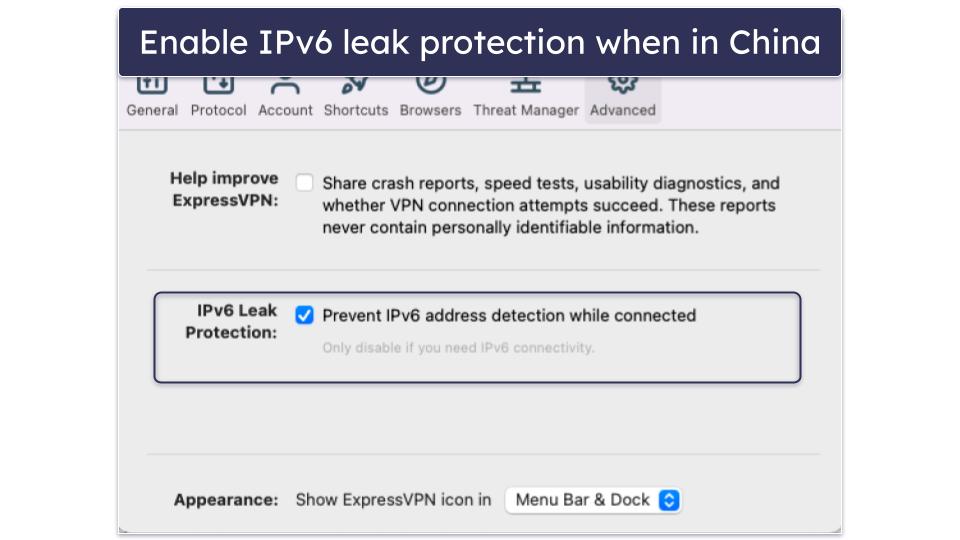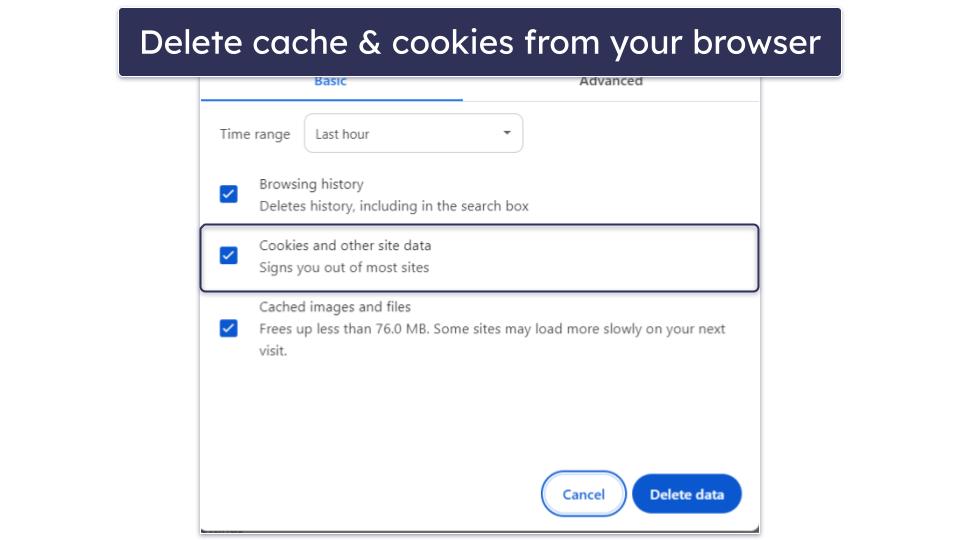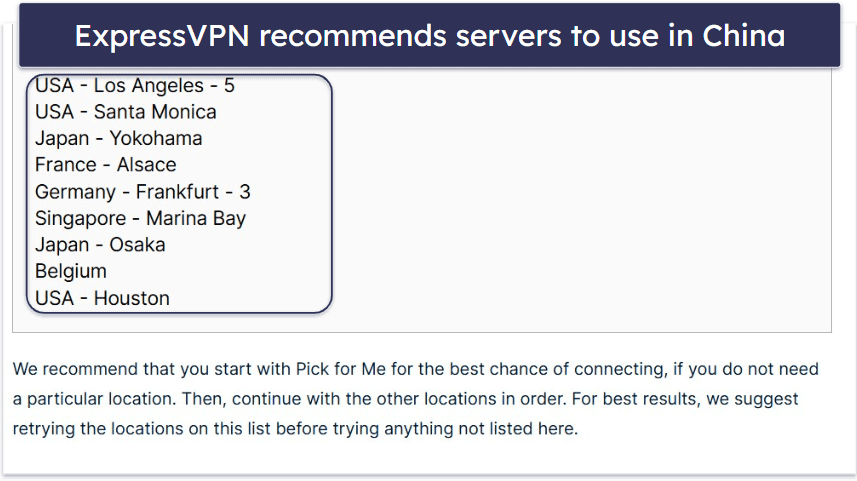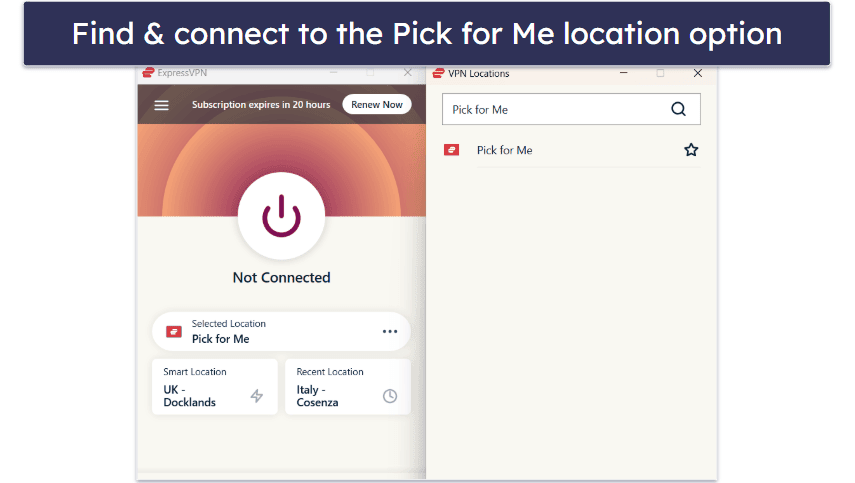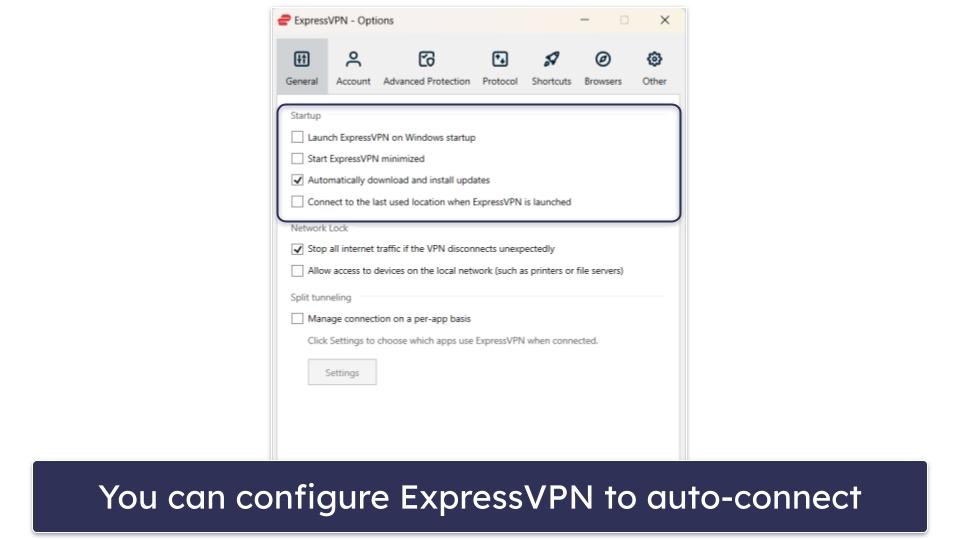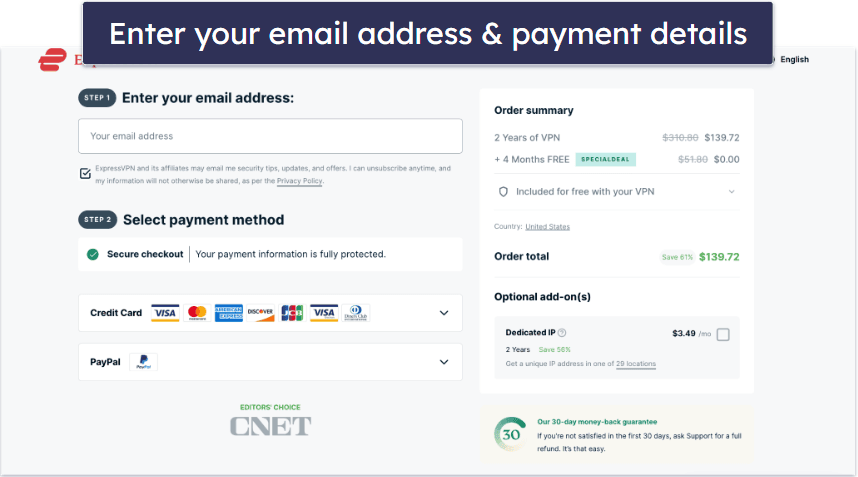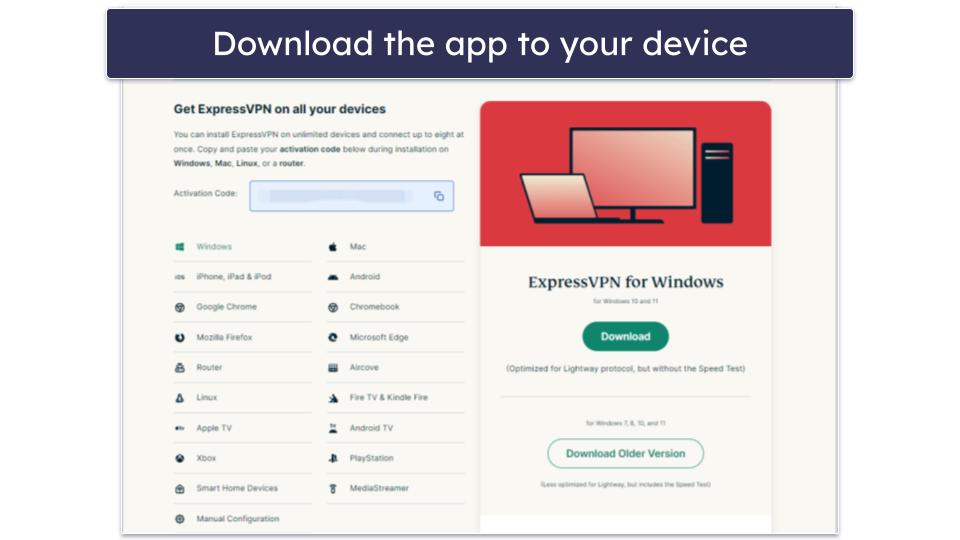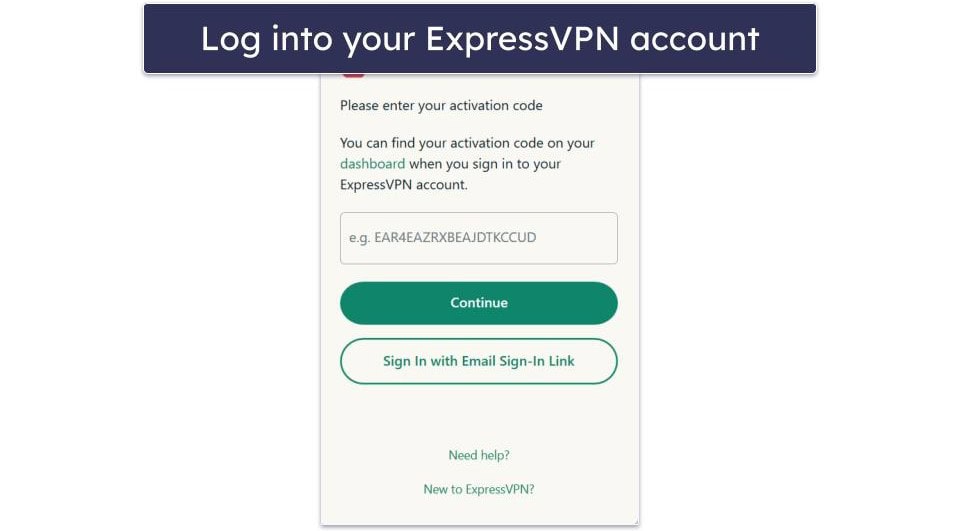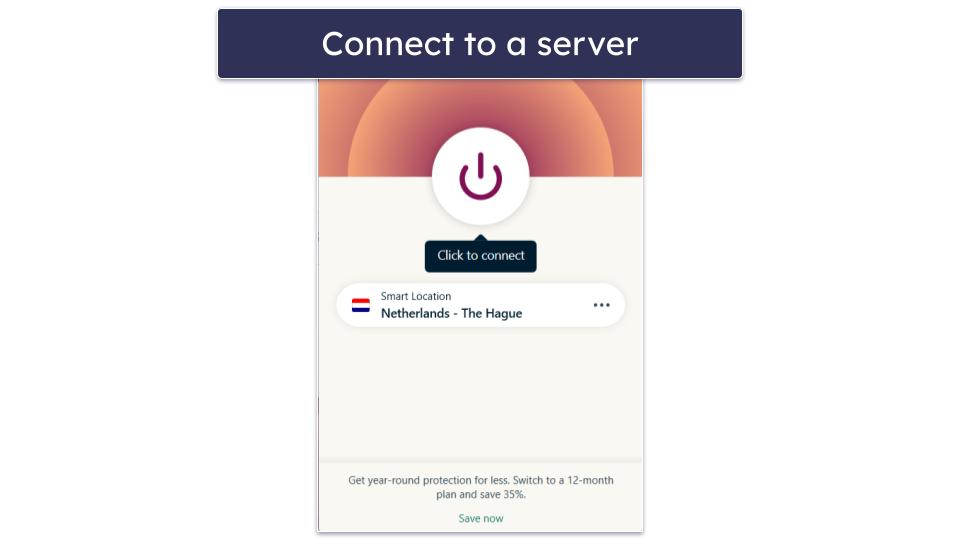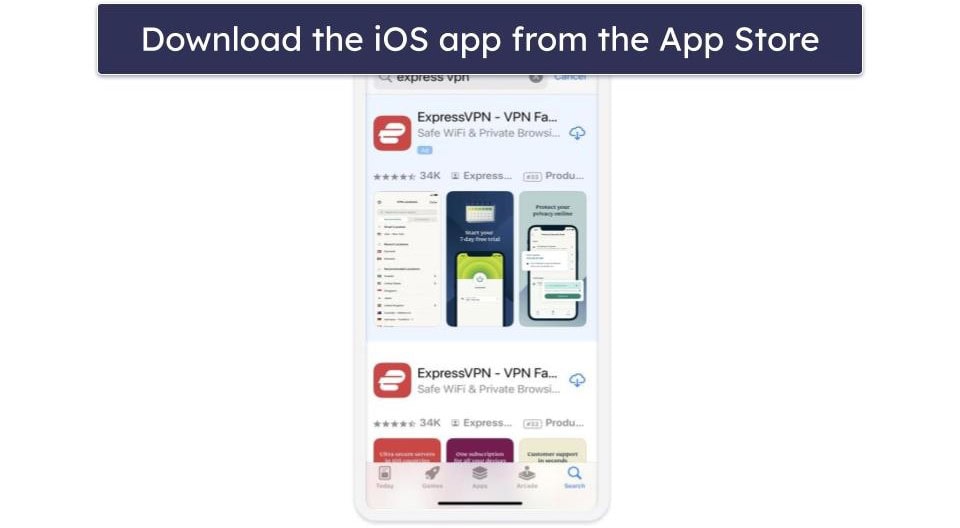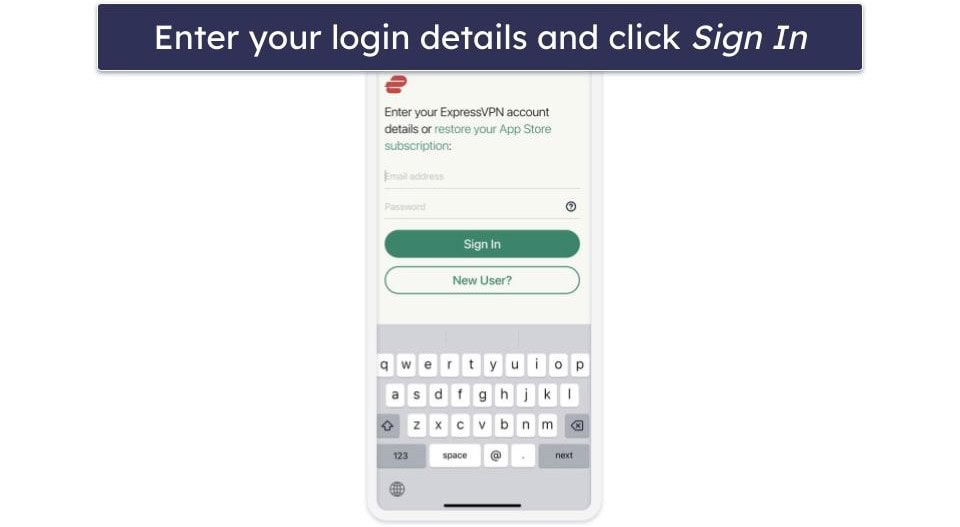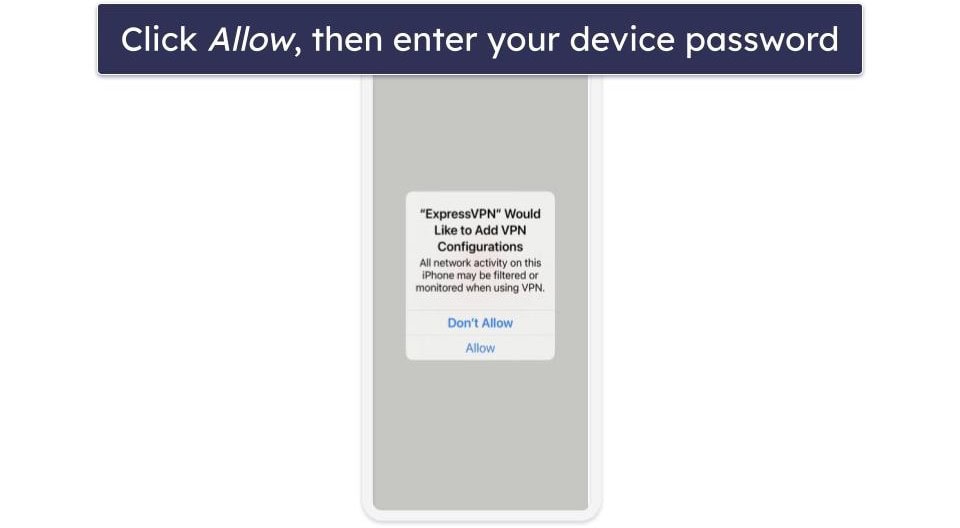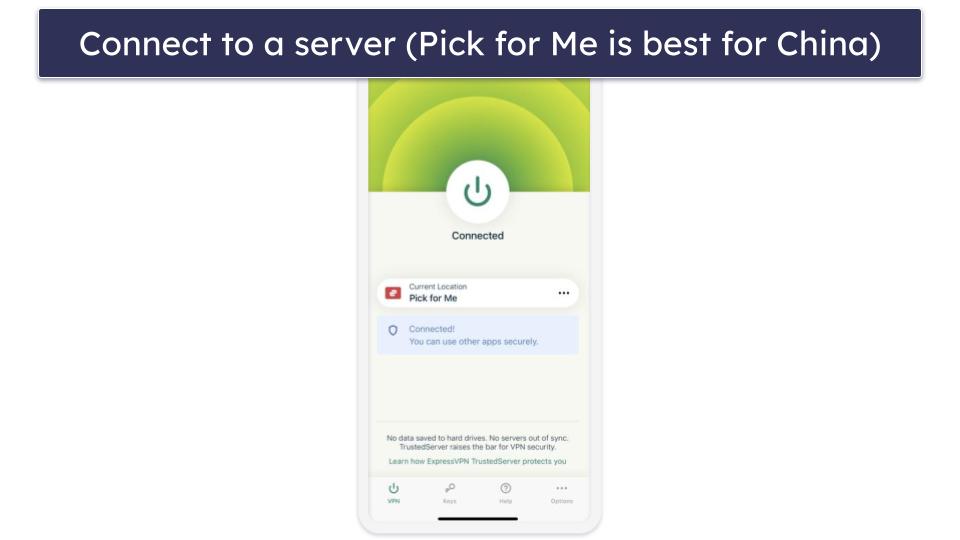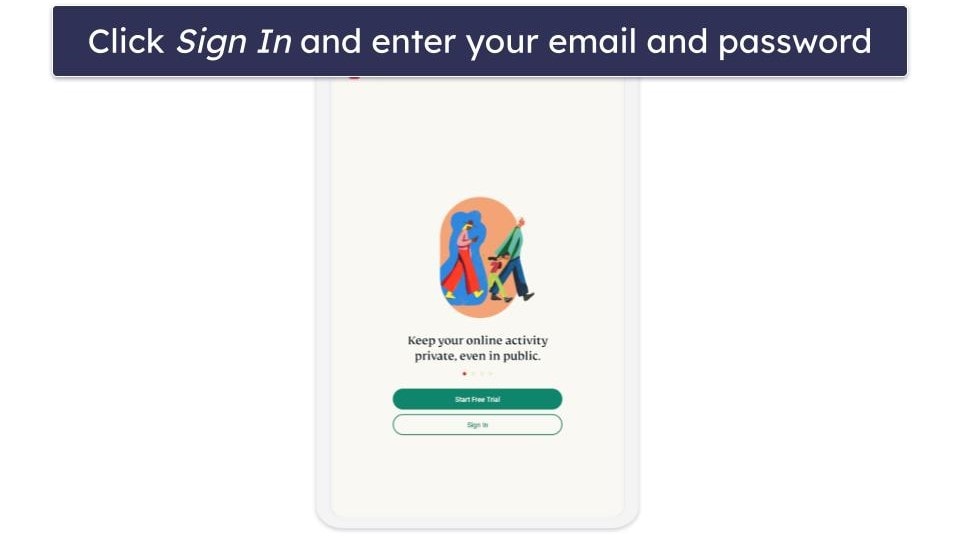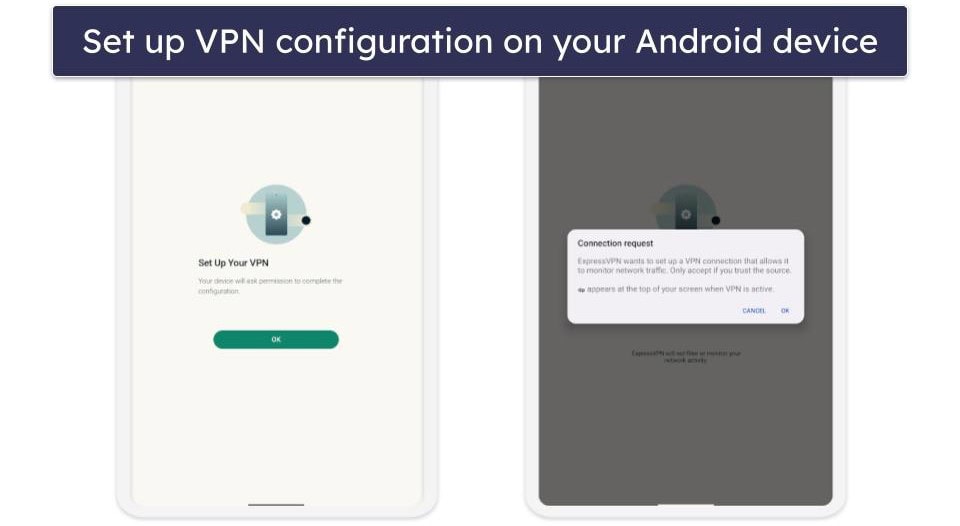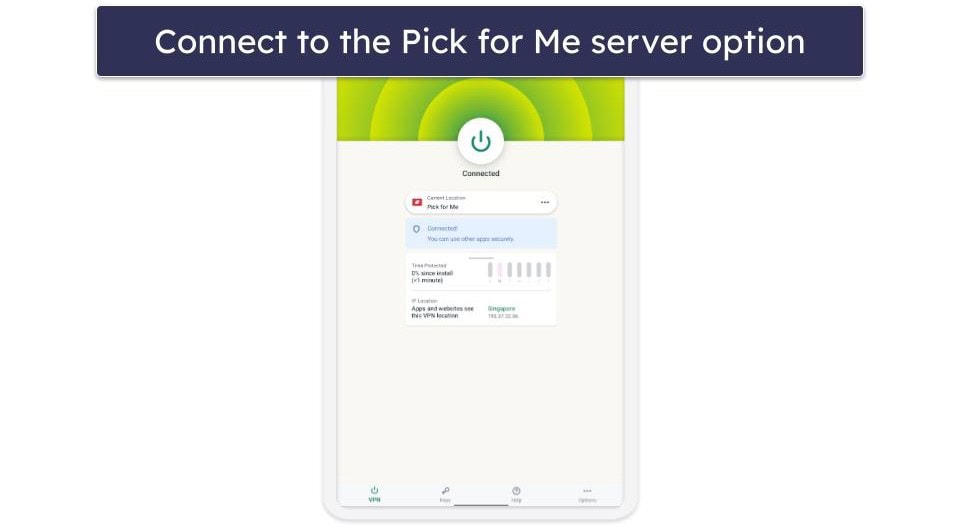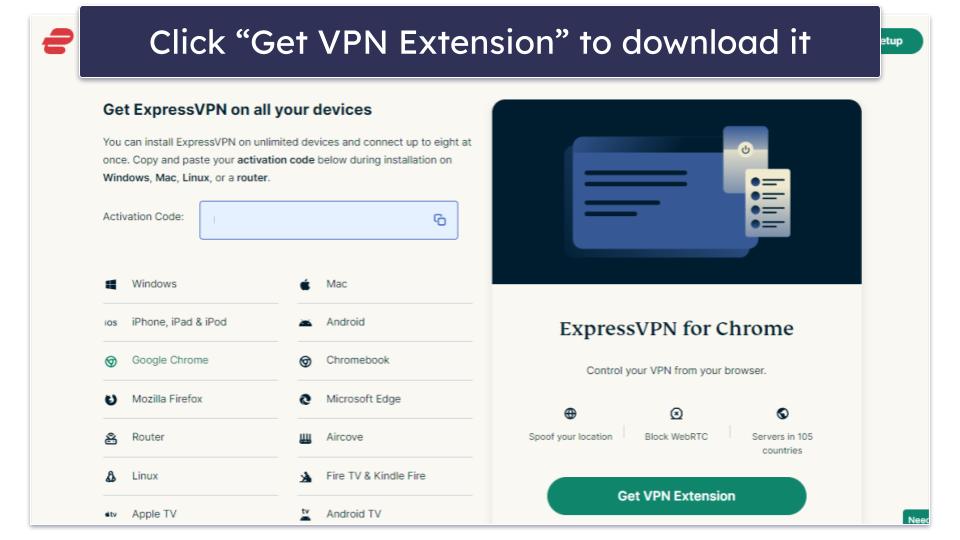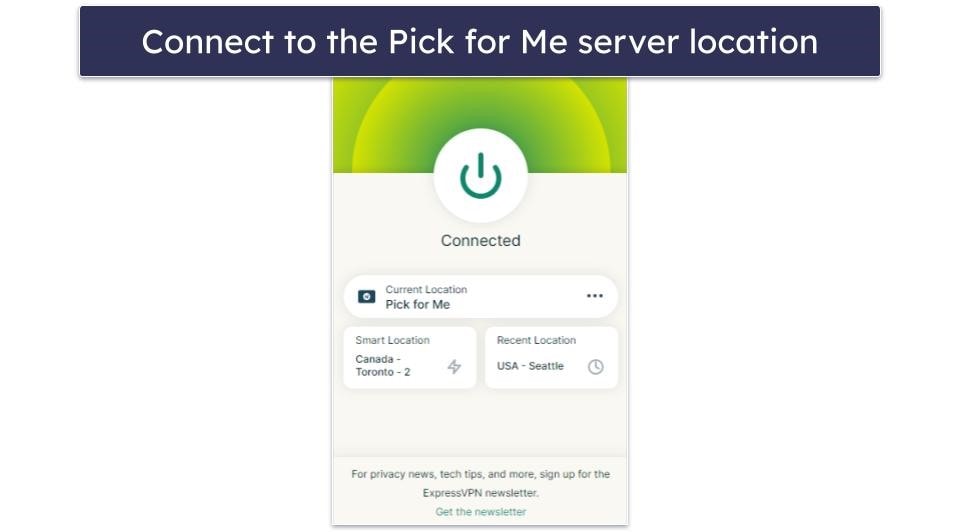
Penka Hristovska
Updated on: February 3, 2025
Fact-checked by Eric Goldstein
Short on time? Here’s how to use ExpressVPN in China in 2025:
- Download and install the VPN. It’s best to sign up for and purchase an ExpressVPN subscription plan before you leave for China because the VPN’s website is blocked by the country’s Great Firewall. If you’re already in China, email its customer support at support@expressvpn.zendesk.com for a mirror link to the site to download the VPN app.
- Launch the VPN app. ExpressVPN recommends using the Automatic protocol option in China. This is the default in all ExpressVPN apps, but you can easily check and adjust it in the Settings menu.
- Connect to a server in another country. I recommend connecting to a nearby server in Japan or Singapore for the fastest speeds.
ExpressVPN is one of the only VPNs that can get around censorship in China. It uses obfuscated servers and other sophisticated technology that lets you access the free and open internet undetected. ExpressVPN also has industry-leading security features that protect your traffic from Chinese government surveillance.
In this guide, I’ll show you how to get ExpressVPN to work in China despite the government’s efforts to block it due to its refusal to share user data with Chinese authorities. You’ll also find instructions on how to get an ExpressVPN subscription when you’re already in China.
Editor’s Note: Connectivity in China can be unreliable due to the country’s censorship, causing occasional VPN interruptions. Nevertheless, ExpressVPN is usually reliable and offers a 30-day money-back guarantee for new users to try it risk-free. China bans non-government-approved VPNs, including ExpressVPN, but the government typically targets VPN providers rather than users. We don’t condone using a VPN for illegal activities. Use a VPN at your own risk and always follow local regulations.
Editors’ Note: ExpressVPN and this site are in the same ownership group.
How to Get ExpressVPN to Work In China
After installing the app, there are a few quick configuration steps to take. These will help maximize your chances of getting ExpressVPN to work in China.
1. Use the Automatic Protocol Option
ExpressVPN recommends setting the protocol to Automatic, which selects the best available protocol to more reliably work with China’s Great Firewall.
Although all of ExpressVPN’s protocols offer obfuscation, some are better than others in particular situations, and this is very important when you’re dealing with strict VPN restrictions, like in China. Plus, this way, you don’t have to manually search for the best protocol in China — ExpressVPN removes the guesswork with the Automatic option.
All of ExpressVPN’s protocols offer obfuscation, which is a technology that disguises your VPN traffic as regular web traffic to avoid VPN detection. This is useful if the network blocks VPN traffic.
However, some protocols work better than others depending on network conditions. This is because different networks, like public Wi-Fi networks in hotels or schools in China, may have specific configurations or restrictions that affect VPN connectivity.
Since the Great Firewall is constantly evolving to detect and block VPNs, this is the best option to choose to stay undetected in China without having to manually adjust configurations every time — ExpressVPN removes the guesswork with the Automatic option, which is why it’s on the top of the list of the best VPNs for China.
How to select the Automatic protocol option:
- Go to the Protocol setting. This can be found by clicking on the menu icon and selecting Preferences.
- Select the Automatic radio button to set the protocol.
2. Try the OpenVPN TCP Protocol
If setting the protocol to Automatic doesn’t prevent the blocking of your internet connection, it might be that China’s Great Firewall is blocking a port that ExpressVPN is using to access the open internet in the country.
A port is like a virtual “doorway” that allows your device to communicate with ExpressVPN’s servers. VPNs use different port numbers to send data over the internet. ExpressVPN, by default, assigns ports based on the selected protocol (e.g., OpenVPN, Lightway, IKEv2). However, if the Great Firewall detects that a port is commonly used by VPN traffic, it may block it, cutting off your connection.
If this happens, switching to the OpenVPN TCP protocol, which uses port 433, may help. Port 443 is the standard port for HTTPS traffic, which is the default protocol for secure web traffic. Since the entire internet relies on HTTPS for encrypted data transfer, blocking this port would effectively break most online services — it’s highly unlikely China will block it.
3. Make Sure the Kill Switch and Leak Protection Are On
The kill switch and DNS/IPv6 leak protection keep all your internet traffic inside the VPN tunnel. The kill switch instantly cuts off your internet if the VPN disconnects, preventing accidental exposure. Leak protection blocks DNS and IPv6 requests from escaping the tunnel.
If these features are off, certain traffic, especially IPv6 data, can leak outside the VPN while DNS requests still route through the VPN server. This mismatch, where your browsing appears to come from a local Chinese IP but your DNS queries point to a foreign VPN, makes it easy for the Great Firewall to detect and block your connection.
Once this happens, you might be flagged as a VPN user, which may lead to future connection issues on the same network.
ExpressVPN’s kill switch, called Network Lock, is enabled by default. However, if the kill switch is disabled, you can quickly re-enable it by doing the following:
- Open General settings. You’ll find this by clicking on the menu icon and selecting Preferences.
- Turn on the kill switch. Next to Network Lock, check the box that says Stop all internet traffic if the VPN disconnects unexpectedly.
DNS and IPv6 leak protection are also enabled automatically. This is how you can double-check if IPv6 leak protection is on:
- Open Advanced settings. This can be done by clicking on the menu icon and selecting Preferences.
- Make sure that IPv6 Leak Protection is enabled. The box that says Prevent IPv6 address detection while connected should be checked.
- Check that DNS and WebRTC leak protection are working. At the bottom of the ExpressVPN home page under Tools, click on DNS Leak Test, and then WebRTC Test. You can also access these tools through the ExpressVPN app on desktop under Help & Support. The result of each test should say “No leak detected”.
4. Clear Your Browser’s Cache and Cookies
When you browse the internet without a VPN, your browser stores data like cookies, cached files, and location information tied to your real IP address. This means that if you later connect to ExpressVPN and visit the same websites, they may still recognize the stored data from your previous session and notice a mismatch between your old IP (without VPN) and your new IP (with VPN).
Chinese network filters and some websites use this inconsistency to detect VPN usage. By clearing your browser’s cache and cookies, you remove this identifying information, making it harder for network filters and websites to detect your true location or identify VPN traffic.
5. Connect to ExpressVPN’s Recommended Servers for China
ExpressVPN offers a list of servers it recommends that you connect to in China. This list includes:
- UK (Wembley)
- US (Los Angeles – 5, Santa Monica, & Houston)
- Belgium
- France (Alsace)
- Germany – Frankfurt – 3
- Singapore – Marina Bay
- Japan – Osaka
- Japan – Yokohama
If you don’t need a specific location, it’s best to connect to ExpressVPN using the Pick for Me location in the app — it’ll provide you with the best speeds possible and connect you to a server that’s the most likely to work in China. To find it, just type “Pick for Me” in the search bar and click to connect to it.
6. Wait for the Connection
It could take up to 30 seconds to connect if you’re in a part of China with slow internet speeds. If you still can’t connect, try exiting the app and restarting your device.
You can also set up the VPN to auto-connect on launch to make sure ExpressVPN kicks in when you start your device, so you’re always covered without having to think about it. But I recommend using this option alongside Network Lock to prevent any accidental exposure if the auto-connect fails.
7. Keep Trying to Reconnect to the Same Server Location
You may need to reconnect to the same server location multiple times until you get a connection, especially if the connection has worked for you in the past.
The Great Firewall may block specific VPN server IPs, but each time you attempt to connect, you may be assigned a different IP address within the same server location. If the previous IP was blocked, the new one might work.
If you still can’t connect to a server after multiple attempts, try connecting to a different server location.
8. Switch to a Different Network
If ExpressVPN struggles to connect, it might be due to your current network. ExpressVPN’s performance can vary because Chinese ISPs and network administrators manage connections differently.
Some networks, like public Wi-Fi or university networks, may have stricter filtering and blocking mechanisms in place that interfere with VPN traffic, making it hard to maintain a stable connection. On the other hand, mobile networks or personal hotspots often have fewer restrictions.
9. Reinstall or Update the App
If ExpressVPN isn’t working properly, reinstalling the app can help. Over time, settings may become corrupted, especially after switching networks or making system updates. A fresh installation resets the app to default settings, which can resolve connection issues.
Before uninstalling, make sure you already have the latest installer downloaded. If you’re still outside China, update to the newest version before traveling — an outdated ExpressVPN app won’t work with China’s ever-evolving techniques to restrict VPNs.
If you’re already in China and need to update, email its customer support to access ExpressVPN’s mirror sites.
10. Use ExpressVPN’s Mirror Site
In China, ExpressVPN uses a mirror site, which is an exact copy of its website but with a different URL — this is due to China blocking ExpressVPN’s regular website. However, the Chinese government is constantly trying to also block the mirror site, so ExpressVPN often changes the URL. You’ll need to contact ExpressVPN’s customer support to get the latest URL. It helps to write down the mirror site URL before traveling to China.
11. Contact Customer Support
I recommend contacting the ExpressVPN support team if you can’t connect to an ExpressVPN server in China after trying all the previous steps. The support representatives are friendly and knowledgeable, and they may provide additional tips to help you connect to one of ExpressVPN’s servers.
While ExpressVPN has 24/7 live chat, unfortunately, you’ll likely only be able to contact the VPN via email — China blocks ExpressVPN’s website so you can’t access live chat. Instead, send an email to ExpressVPN at support@expressvpn.zendesk.com (Gmail is blocked there, but here’s how you can try and access Gmail from China). ExpressVPN’s email support is very responsive, as I always received a reply within 3–4 hours.
How Does ExpressVPN Work In China?
ExpressVPN uses obfuscation to disguise VPN traffic as regular internet traffic, helping it bypass detection in China. The Great Firewall relies on Deep Packet Inspection (DPI) to analyze the contents of data packets in real time. If it identifies a VPN protocol signature, it flags the connection and either throttles or blocks it.
To counter this, ExpressVPN automatically applies obfuscation when it detects DPI interference, making VPN traffic appear indistinguishable from normal HTTPS encryption and allowing the connection to remain intact.
In addition, ExpressVPN refreshes its server IP addresses often, which makes it more difficult for the Chinese government to identify and blacklist them through the Great Firewall.
Finally, the VPN automatically uses TCP port 443 with the OpenVPN TCP protocol. TCP port 443 is the same port used by HTTPS, which accounts for most non-VPN internet traffic and is nearly impossible to block.
Still, the main reason why ExpressVPN can access the open internet in China most of the time is that it doesn’t have any servers within mainland China. By keeping its servers outside of the country, ExpressVPN isn’t subject to data retention laws that require providers to keep and comply with government demands for user data.
Please note that due to China’s strict censorship, VPN connectivity may experience interruptions. However, ExpressVPN offers a 30-day money-back guarantee, so you can try it risk-free and get a full refund if it doesn’t work for you.
Editors’ Note: ExpressVPN and this site are in the same ownership group.
Why You Should Use ExpressVPN in China
There are several reasons to use ExpressVPN in China, but the main one is that you won’t have to worry about your online privacy with it.
ExpressVPN has top-of-the-line security that prevents the Chinese government from seeing your online activity. It doesn’t have servers in mainland China, keeping it exempt from Chinese data retention laws. Plus, it has a strict no-logs policy that’s been independently verified multiple times, which means that it doesn’t store any of your data, so it can’t ever share your information even if authorities request it.
Combined with its military-grade AES 256-bit encryption, full leak protection, and reliable kill switch, this means that nobody will be able to snoop on your online activities — not even the Chinese government.
Another huge reason is that ExpressVPN is super fast. Even with obfuscation, you’ll get really fast speeds for all online activities you engage in from China, including streaming in HD. Plus, it has a lot of servers near China, so you can connect to the one that offers the best speeds. The Quick Connect feature even chooses the fastest server for you.
Furthermore, ExpressVPN can access YouTube from China, lots of top streaming sites like Netflix and Hulu, as well as social media apps like Instagram and WhatsApp in China.
No matter what kind of device you have, ExpressVPN has a dedicated app for your operating system or platform, including Android, iOS, macOS, and Windows. It even offers browser extensions and supports routers, so you can protect every device in your home. And the user interface is incredibly intuitive.
Finally, ease of use in China is a big deal. ExpressVPN’s apps are very simple to use and there aren’t any super complicated configurations you need to perform to make the VPN work in China.
How to Install ExpressVPN (Step-by-Step Guide)
I recommend installing ExpressVPN before traveling to China on all devices you plan to use there to ensure uninterrupted access to the internet. It’s important to do this before you get to China, since the country’s Great Firewall blocks access to the ExpressVPN website, and you’ll have to jump through some hoops to purchase and download the VPN to your devices. Here’s how to install ExpressVPN from outside China.
PC or Mac
- Visit ExpressVPN’s website. Click Get ExpressVPN or Get Started to continue.
Editors’ Note: ExpressVPN and this site are in the same ownership group.
- Choose a plan. ExpressVPN has multiple plan lengths available. Choose the one that works for you (the longest plans provide the best discounts).
Editors’ Note: ExpressVPN and this site are in the same ownership group.
- Create an account. ExpressVPN only requires your email address and payment details to sign up. It accepts a variety of payment methods including credit/debit card, PayPal, cryptocurrency, and more.
Editors’ Note: ExpressVPN and this site are in the same ownership group.
- Download the app. ExpressVPN has great PC and Mac apps. Select the app for your device and follow the installation wizard’s instructions. The process won’t take more than 2-3 minutes.
Editors’ Note: ExpressVPN and this site are in the same ownership group.
- Sign in and connect. Sign in to your account using your activation code.
Editors’ Note: ExpressVPN and this site are in the same ownership group.
- Connect to a server to make sure the VPN works.
Editors’ Note: ExpressVPN and this site are in the same ownership group.
iPhone or iPad
- Create an account. Visit expressvpn.com and set up an account. It will only take a few minutes.
- Download the app from the Apple Store. Installing it takes less than a minute.
- Log into your account. Enter your email address and password to sign in.
- Allow VPN configurations. Click Allow and then enter your device password in settings to allow VPN configurations.
- Connect to a server. ExpressVPN recommends using the Pick for Me server location for use in China.
Android Smartphone or Tablet
- Visit ExpressVPN’s official website and make an account. You’ll need to choose a plan, enter your email address, and input your payment information.
- Download ExpressVPN’s Android app. Visit the Google Play Store, search for ExpressVPN, and download the app. This will take less than a minute.
- Sign in. To log into your account, click Sign In and enter your email and password.
- Allow VPN configuration. ExpressVPN needs permission from your device to work. Click OK and follow the instructions in settings.
- Connect to a server for China. ExpressVPN recommends choosing the Pick for Me option.
Browser Extension
- Visit ExpressVPN’s website and create an account. It will require your email address and a payment method like PayPal or a credit card.
- Get the extension for your preferred browser. Click on “Get VPN Extension” to install it.
- Sign in. If you have the VPN app on your device and are logged in, you’ll be logged in automatically on the browser extension.
- Connect to a server. Using the Pick for Me server option is recommended for connections in China.
Editors’ Note: ExpressVPN and this site are in the same ownership group.
How to Get ExpressVPN If You’re Already in China
You probably won’t be able to access ExpressVPN’s site in China because it’s blocked by the government. Here’s what you can do instead to get ExpressVPN in China:
- Use its mirror website. This is a copy of ExpressVPN’s website, but with a different URL address, making it harder for firewalls to detect and block it. ExpressVPN often changes the URL for its mirror site, so you’ll have to contact ExpressVPN’s customer support to get the latest mirror link.
- Use a free proxy to access ExpressVPN. A proxy changes your IP address but doesn’t encrypt your data. I recommend using a web proxy since you can just copy and paste ExpressVPN’s website link in the search field.
- Ask a friend outside of China. If you have a friend living outside of China, you could ask them to sign up for ExpressVPN for you. Once they sign up, they can send you the installation files and login credentials via email.
-
Use the SIM card from your home country.
- If your SIM card supports roaming, you can connect to the internet with it and sign up with ExpressVPN on the official site. Your Chinese ISP isn’t in charge of your roaming data, so you won’t have to worry about any government firewalls or restrictions.
- Email ExpressVPN for the .apk app if you use Android. If you already have an ExpressVPN subscription and you’re using an Android device, you can try to install the .apk app; this way, you don’t need the app store to get ExpressVPN. You can get the latest .apk file by contacting ExpressVPN’s email support team.
- Change your App Store region. For iOS users, changing your App Store region to a country where ExpressVPN is available may allow you to download the app directly. Note that this requires access to your Apple ID settings.
- Think about planning a journey to Hong Kong or Macau. The Chinese authorities conduct some online surveillance in these areas, but they are beyond the Great Firewall, meaning you should have the ability to visit ExpressVPN’s website, register, and install the application.
Other VPNs that Work in China
ExpressVPN is the best VPN for China. That said, if you can’t get it to work even after trying all of the above suggestions, there are some other good options. Here are some alternatives to try:
- Private Internet Access (PIA) — This VPN has obfuscation through the open-source encrypted Shadowsocks proxy, refreshes its IPs often, and provides access to the 443 port with OpenVPN. It also has great security, including an audited no-logs policy for anonymity, full leak protection, and more. PIA has servers in 91 countries, several of which are near China (Hong Kong, the Philippines, and Japan).
- PrivateVPN — PrivateVPN refreshes its IP addresses frequently, lets you use port 443 via OpenVPN, and has obfuscation (StealthVPN). It has fast servers in 63 countries, including those near China like Japan and Singapore.
- TunnelBear — TunnelBear regularly refreshes its IPs, has obfuscation via GhostBear, and has advanced security features like an audited no-logs policy. Its apps are very user-friendly too. It has servers in 47 countries, including Taiwan and South Korea.
Editors’ Note: Private Internet Access and this site are in the same ownership group.
Frequently Asked Questions
What should I do if ExpressVPN doesn’t work in China?
If ExpressVPN isn’t working for you in China, I recommend trying the tips mentioned in this article. These include setting your protocol settings to Automatic, using ExpressVPN’s recommended servers for China, clearing your browser cache and cookies, and many other tips.
If ExpressVPN still isn’t working for you, I recommend reaching out to ExpressVPN’s customer support via email at support@expressvpn.zendesk.com (but note that Gmail is blocked in China). Email is the best way to contact ExpressVPN because China blocks ExpressVPN’s website, so you won’t have access to 24/7 live chat.
Is it legal to use a VPN in China?
It’s complicated. China has banned non-government-approved VPNs like ExpressVPN, and it’s illegal to use a commercial VPN in China. The government says that you could be fined for using ExpressVPN, but there are no reports of a foreigner ever being fined for using a non-approved VPN.
The government tries to block non-approved VPNs rather than go after individual users. However, I always recommend checking the laws of the region you plan to visit or live in. If you’re traveling to China, it’s best to download ExpressVPN before you arrive because the app and website are blocked there.
Can I use ExpressVPN on Android, iOS, or my router in China?
Yes, ExpressVPN offers native apps for iOS, Android, and routers that work in China. All of ExpressVPN’s servers have obfuscation, so you can use the VPN on whichever device you need. However, I recommend downloading and installing ExpressVPN on your device before traveling to China because China has blocked access to ExpressVPN’s website.
Does ExpressVPN have servers in China?
ExpressVPN doesn’t have physical servers in mainland China, but it does have servers in Hong Kong and Macau, which aren’t behind the Great Firewall. Nonetheless, the Chinese government monitors some internet traffic and blocks some websites in Hong Kong and Macau. To make sure you have access to a free internet, connect to a nearby server location in Japan or Singapore.
Why is the internet censored in China, and which websites are blocked?
China prevents the public from accessing content the government deems inappropriate. This includes information that could be considered damaging to the government, suggestive content, and gambling sites. The following sites are blocked by the Great Firewall:
- Social media sites and apps: Facebook, Instagram, Twitter, and others.
- News websites: BBC, The New York Times, The Guardian, The Wall Street Journal, The Washington Post, Bloomberg, NBC, and others.
- Search engines: Yahoo, DuckDuckGo, Google, Bing, and others.
- Messaging services: Gmail, WhatsApp, Telegram, Snapchat, Skype, Slack, and others.
- Information providers: Quora, Wikipedia, WordPress, Archive.
ExpressVPN is one of the few VPNs that can allow you to access all of these platforms.
Is ExpressVPN owned by a Chinese company?
No. ExpressVPN is based in the British Virgin Islands, which is a privacy-friendly nation and isn’t part of the 5/9/14 Eyes Alliances (a group of nations that share intelligence data). The British Virgin Islands also doesn’t have mandatory data retention laws, so ExpressVPN isn’t required to store your data.
Can I use Tor to access ExpressVPN in China?
Using Tor to access ExpressVPN in China is technically possible but isn’t a good idea. The Chinese government employs advanced technology to detect and block bypassing tools and VPNs, including Tor nodes, and Tor doesn’t refresh its IPs very often. So, it’s unlikely to work most of the time.
Additionally, using Tor in China will be painfully slow, and Tor doesn’t protect your privacy very well since it may leak your real IP address. Plus, malicious actors can run their own Tor servers.
Instead, you should download the ExpressVPN app to your device before arriving in China. This way, you won’t have to access ExpressVPN’s site while in China.
Will hotel Wi-Fi provide you with unrestricted access to ExpressVPN in China?
No, this won’t work. Despite what some sources claim, even hotel networks in China strictly censor the internet, regardless if you’re an international visitor or not.
If you plan to use a VPN like ExpressVPN while in China, you should prepare ahead of time. I recommend installing the ExpressVPN app before arriving in China since downloading the app in the country is challenging. If you’re already in China, you can use mirror links or another method to access ExpressVPN in China.
Can you use Shadowsocks to access ExpressVPN in China?
Unfortunately, Shadowsocks cannot be used to access ExpressVPN in China. I tested it myself, and it didn’t work. Plus, the VPN’s support reps informed me that ExpressVPN’s servers don’t support proxy connections, so using it with Shadowsocks won’t work.
But if you want to use a manual Shadowsocks connection to hide VPN traffic, I recommend using a VPN that supports Shadowsocks connections with its servers, like Private Internet Access, which also has built-in obfuscation via Shadowsocks.




